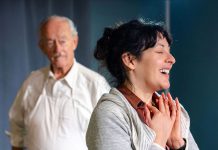Forgiveness
Years ago, Juliette divorced her husband. She felt hurt by the experience and wanted revenge on him. To make matters worse, during the divorce, he came to her home and took a diamond necklace that was hers. She had a lien put against his car, which she had also paid for. A year after the divorce was final, he wanted to sell the car but couldn’t because of the lien. He asked her to release it without offering to return the necklace. She felt torn. Should she just let it go, or force him to return the necklace?
That same day, the rib right over her heart was dislocated during a massage. She was in so much pain she could hardly breathe. For several weeks, she struggled simultaneously with the rib pain and the dilemma with her ex-husband.
One month later, she woke up in the morning feeling clear. She felt no anger or desire for justice regarding her ex. She was able to let go of all her hurt feelings without needing any apology or resolution from him. Suddenly, she didn’t care about her necklace but also knew what she had to do.
When she came in for acupuncture that day, her rib pain went away. She said it felt as though the rib pain wouldn’t go away until she had forgiven her ex.
We all have painful stories. We can allow them to injure our spirits and actions for the rest of our lives, or we can find a way to become peaceful with those experiences, and hopefully, even grow from them.
Forgiveness is critical for your health. Besides the emotional burden of not forgiving, you wouldn’t believe how much past-pain and anger continue to affect our bodies and spirits. If you can think of your negative emotions as parasites, you can imagine that they have the ability to do real physical harm.
In my medical practice, I have consistently found that harboring bad feelings very often affects the speed at which you are able to heal your physical problems.
Forgiveness is easier said than done. Sometimes, it can be the absolute hardest thing to do.
One of the most phenomenal stories I have heard on this forgiveness takes place in Sierra Leone. I encourage you to watch Libby Hoffman’s TEDxDirigo talk “Forgiving the Unforgiveable.”
Between 1991 and 2002, Sierra Leone survived one of the most brutal civil wars in history. 50,000 people died. There were mass murders, rapes, and systematic mutilations. After the conflict, a program was created called Fambul Tok (“family talk” in Krio) which brings victims and perpetrators from Sierra Leone’s civil war together in ceremonies of truth telling, apology, and forgiveness.
In “Forgiving the Unforgiveable,” Libby shows a film documenting how two friends, Sahr and Nyumah, and Sahr’s father were attacked during the civil war. Nyumah was forced to kill Sahr’s father in front of Sahr. After killing Sahr’s father, Nyumah was then forced to severely beat Sahr. Truly unforgivable acts. However, on video you get to see the reconciliation of the two friends: how Sahr is able to forgive Nyumah, and how Nyumah slowly allows himself to start forgiving himself. Friendship is restored and they become even closer friends.
How does one find the strength or desire to forgive? When we have been wronged, we have to journey to a place where we can begin to ask ourselves: Are you ready to forgive? What would it take for you to be ready? What would it take for you to feel resolution from the experience? The road is tough, but restoring peace is possible.
The story of Sierra Leone is extreme. Most of us are more like Juliette with difficulty forgiving past insults, child abuse, or even the driver who almost hit us in traffic. Carolyn Myss published a book titled “Why People Don’t Heal And How They Can,” in 1998. She tells story after story of people who refuse to give up their painful past and how it impacts their health.
Studies show that forgiveness helps lower blood pressure, cholesterol, and heart rate. It improves sleep quality, and reduces levels of depression, anxiety and anger. People who forgive tend to have better relationships, feel happier and more optimistic.
I encourage you today to look inside yourself to places that you may be afraid to go. Think of one thing that you haven’t forgiven. Try to find those places that you want to be healed, and start your way towards finding forgiveness.
Dr. Shiroko Sokitch’s column appears monthly. She can be reached at: dr*****@***mc.com.







